Media Statement – 28/7/2023
Abolish Whipping, a Cruel, Inhumane and Degrading Penal Punishment in Malaysia
We, the undersigned 27 groups call on Malaysia to abolish the sentence of whipping or caning, which is an inhumane, degrading and cruel form of penal punishment. Whipping, is a corporal punishment, that is a violation of human rights. In Malaysia, it exists as sentences for more than 50 different criminal offences, and many times as a mandatory sentence, in Malaysia.
In Malaysia, whipping is penal statutes, was first introduced by the British in the 19th century, first codified under the 1871 Penal Code Ordinance of the Straits Settlements, and is still retained in many laws and is a sentence for more than 50 offences.
Criminal Justice Act 1953 Section 4 stated, ‘No person shall be sentenced by a court to whipping with a cat-o'-nine tails; and every law conferring power on a court to pass a sentence of whipping with a cat-o'-nine tails, or whipping, shall be construed as conferring power to pass a sentence of whipping with a rattan.’.
Using a rattan does not diminish the fact that it is still cruel and inhumane. Penal whipping is so much worse that the caning normally imposed by Islamic law in Malaysia. Poor undocumented foreigners and/or migrant workers are the biggest victims of whipping in Malaysia.
Many countries have already abolished whipping as a punishment from their statutes, such as India and the United Kingdom, pursuant to the Indian Abolition of Whipping Act 1955 and the Criminal Justice Act 1948, respectively. On April 2020, it was reported that Saudi Arabia also have abolished flogging as a form of punishment.
Whipping – a mandatory sentence in laws
Immigration Act 1959/63 was amended and as of August 2002, and the sentence of whipping was introduced for undocumented migrants, who if convicted shall be liable to a fine not exceeding ten thousand ringgit or to imprisonment for a term not exceeding five years or to both, and shall also be liable to whipping of not more than six strokes. To date, Malaysian law still does not recognize asylum seekers or refugees, and as such they are considered illegal or undocumented foreigners/migrants and are at risk of being whipped.
“According to Prisons Department records, 47,914 foreigners were found to have violated the Immigration Act from 2002 to 2008. Of these, 34,923 were caned or whipped. The trend continues, and undocumented migrants in Malaysia may likely make up the majority of those being whipped.
Abolition Of Mandatory Death Penalty Act 2023 now provides for an alternative to death penalty, being a 30-40 years sentence of imprisonment, ‘and if not sentenced to death, shall also be punished with whipping of not less than twelve strokes.’ This means that if one is not sentenced to death, but to imprisonment then judges have no choice but to sentence to be whipped at least 12 times. The Parliament removed the judge’s discretion not to sentence whipping by making the sentence mandatory.
Whipping – Experience of Victims
In all cases, the whipping is inflicted on the buttock of the offender by specially trained officers using a ‘rattan used for whipping shall be not more than half an inch in diameter.’
‘Whipping is clearly intended to be a humiliating experience as it will produce huge red welts and permanent scars. It is also said to have caused impotence. The cane marks are permanent and these will be a source of humiliation to the prisoner for the rest of their lives.
New Zealander, Aaron Cohen who received six strokes in 1982 for drug-trafficking recalled his ordeal: -
“I got six. It’s just incredible pain. More like a burning - like someone sticking an iron on your bum. That’s the sort of feeling. Pain - just ultimate pain. The strokes come at a rate of one a minute - but it seemed like a lifetime to me. I waited and waited for the first one and as soon as I let my breath out - “baam”. Afterwards my bum looked like a side of beef. There was three lines of raw skin with blood oozing out.” ..’ - Extract from preamble of the 2007 Malaysian Bar Resolution For The Abolition Of Corporal Punishment Of Whipping.
Sabri Umar, the wrongly convicted documented Indonesian migrant worker, who was a legal migrant worker had this to say about his experience of being unlawfully whipped.
‘… Sabri Umar said all the inmates were asked to strip with only a piece of cloth to cover their private parts. “We took turns to step onto a wooden frame and our legs were spread apart but not bound. Our hands were spread upward and tied to the frame we were standing on. “They untied us after the caning and told us to put on our shirts back while we waited in a group and watched others being caned,” described the 31-year-old, his voice quavered as if he was reliving the horror again.
“Many of them screamed and cried, but those who were stronger didn’t cry. I remember one person receiving 10 strokes that day. “After being caned, I immediately felt drained of all my energy. The cane tore the skin on my buttocks and I started to bleed after a few minutes. “I could not sit for the next 10 days and I slept facing down to avoid making my wounds worse,” Sabri recalled. (Malaysiakini, 17/8/2022). Sabri Umar was unlawfully whipped as his appeal was pending, and the law specifically prohibits whipping until appeals are over.
Whipping is dangerous and can cause permanent harm
Without a doubt, whipping is excruciatingly painful which would result in extensive soft tissue injury and possibly other injury, possibly even permanent.
The law acknowledges the health risk that comes with whipping, and as such requires the presence of a Medical Officer.
Section 2 of the Criminal Procedure Code, “(1) The punishment of whipping shall not be inflicted unless a Medical Officer is present and certifies that the offender is in a fit state of health to undergo such punishment. (2) If, during the execution of a sentence of whipping, a Medical Officer certifies that the offender is not in a fit state of health to undergo the remainder of the sentence the whipping shall be finally stopped…”. No sentence of whipping shall be executed by instalments, and that means once stopped, it cannot be later resumed on another day.
The then Minister in the Prime Minister’s Department (Parliament and Law) Datuk Seri Wan Junaidi Tuanku Jaafar “Personally, I view whipping as very brutal and violent and simply inhumane… most offenders suffer open wounds with many fainting after three strokes.”
By law, whipping cannot be affected in the same way on youthful offenders (who above the age of eighteen and below the age of twenty-one). For youthful offenders, whipping shall be inflicted in the way of school discipline with a light rattan. Women, males sentenced to death and generally males whom the Court considers to be more than fifty years of age cannot be punished with whipping. (Sec. 289, CPC.
Abolition Call by SUHAKAM, Malaysian Bar, previous PN government, …
Noting also that the immediate past Perikatan Nasional government, before the last General Elections, had said on 6/9/2022 via the Minister in charge of Parliament and Law that ‘Malaysia will abolish the mandatory death and whipping sentences by next year, with amendments to the laws to be tabled in Parliament next month. (Malay Mail). On 10th October, Parliament was dissolved making way for the General Elections.
We ask that the current Pakatan Harapan-led unity government of Prime Minister Anwar Ibrahim, if committed to human rights, will speedily abolish whipping and corporal punishment in Malaysia, which is internationally acknowledged form of torture.
The Malaysian Bar, SUHAKAM(Malaysian Human Rights Commission) and many others have called for the abolition of whipping. On 23/8/2022, ‘Suhakam urged the government to prohibit corporal punishment by abolishing all domestic laws warranting the imposition of corporal punishment such as whipping and caning, which are all inconsistent with international human rights principles.’ . On 3/4/2023, government backbencher, Hassan Karim also called the abolition of the “sadistic, primitive and inhumane” caning punishment.
The Human Rights Measurement Initiative’s (HRMI) Rights Tracker 2023, measured…Malaysia having the lowest score for the right to freedom from torture and ill-treatment, at 4.9 out of 10. Malaysia remains one the rare democracies that has not yet ratified the UN Convention against Torture and Other Cruel, Inhuman or Degrading Treatment or Punishment. (Malay Mail, 23/6/2023)
Therefore, we
a) Call on Malaysia to speedily abolish whipping as a sentence in all laws;
b) Call for an imposition of an immediate moratorium on whipping pending abolition;
c) Call for the abolition of the mandatory sentence of whipping, that removes judge’s discretion to not sentence a person to be whipped, as is also found in Abolition of Mandatory Death Penalty Act 2023, where if sentence is not death, the judge ‘…shall also be liable to whipping of not more than six strokes…’ and
d) Call on Malaysia to ratify the UN Convention against Torture and Other Cruel, Inhuman or Degrading Treatment or Punishment.
Charles Hector
Fpr and on behalf the following 27 organisations
ALIRAN
MADPET (Malaysians Against Death Penalty and Torture)
Association of Domestic and Maquila Workers (ATRAHDOM), Guatemala Central America
AACP (Australians Against Capital Punishment)
Black Women for Wages for Housework, International
Building and Wood Workers International (BWI) Asia Pacific Region
German Coalition to Abolish the Death Penalty (GCADP)
Global Women’s Strike, UK
Haiti Action Committee
International Women's Rights Action Watch Asia Pacific
Japan Innocence and Death Penalty Information Center
Lawyers Collective, India
Legal Action for Women, UK
Malaysian Physicians for the Prevention of War
Migrant Care, Indonesia
MAP Foundation, Thailand
North South Initiative
Payday men’s network (UK/US)
Pergerakan Tenaga Akademik Malaysia (GERAK)
Redemption, Pakistan.
Sabah Plantation Industry Employees Union (SPIEU)
Sarawak Dayak Iban Association
Union of Domestic and Maquila workers (SITRADOM), Guatemala
Women of Color/Global Women’s Strike, US
WH4C (Workers Hub For Change)
Persatuan Sahabat Wanita Selangor,Malaysia
JALA PRT (National Network. For Domestic Workers Advocacy) Indonesia
.
The Indonesian migrant worker who was wrongfully imprisoned and whipped said he was among 35 other Tawau Prison inmates who were whipped on the same day, one after another.
Recalling his harrowing experience waiting for his turn to be whipped, Sabri Umar said all the inmates were asked to strip with only a piece of cloth to cover their private parts.
“We took turns to step onto a wooden frame and our legs were spread apart but not bound. Our hands were spread upward and tied to the frame we were standing on.
“They untied us after the caning and told us to put on our shirts back while we waited in a group and watched others being caned,” described the 31-year-old, his voice quavered as if he was reliving the horror again.
Sabri said it was a terrifying moment being gathered in the same area and witnessing others before him being caned.
“Many of them screamed and cried, but those who were stronger didn’t cry. I remember one person receiving 10 strokes that day.
“After being caned, I immediately felt drained of all my energy. The cane tore the skin on my buttocks and I started to bleed after a few minutes.
“I could not sit for the next 10 days and I slept facing down to avoid making my wounds worse,” Sabri recalled.
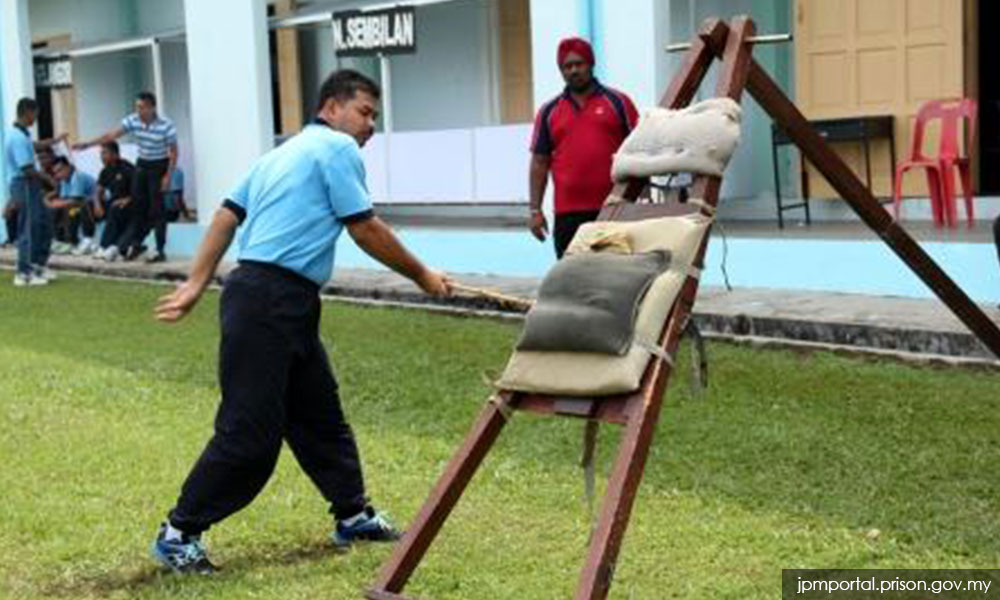
Sabri’s woes
Over a period of just four months since April, the former employee of a plywood factory in Kalabakan in Tawau, Sabah, was wrongfully terminated of his employment, arrested and wrongfully detained by the Tawau police.
Sabri was investigated under Section 14(a) of the Sexual Offences Against Children Act 2017 but eventually charged and sentenced under Section 6(1) (c) of the Immigration Act 1959/63.
He claimed to be innocent of both charges, but the Sessions Court sentenced him to 11 months in jail and five strokes of the cane.
Four months after his arrest, Sabri was acquitted by the High Court in Tawau, but he lived in constant fear of a re-arrest under the sexual offence and of finding himself behind bars as swiftly as he was put there the first time.
Owing to the swift manner by which he was imprisoned and sentenced, Sabri agreed that there was a high possibility that there were other wrongfully imprisoned inmates in the Tawau Prison.
Sabri, who now has the support of the Indonesian Consulate in Tawau, was administered five strokes of the cane despite a pending notice of appeal and he told Malaysiakini that he would seek justice.
For two days after the whipping, Sabri was running a fever and he only took the yellow medicine handed to each inmate after the caning.
He alleged that they received no other medications and some inmates who also had fever were asked to just take a cold shower.
After his acquittal, he went to see a doctor and get himself checked as he was experiencing pain when urinating.
The consul at the Indonesia Consulate in Tawau, Heni Hamidah, told Malaysiakini that they sent Sabri for a second medical test on Monday to find out the extent of the complications resulting from the whipping.
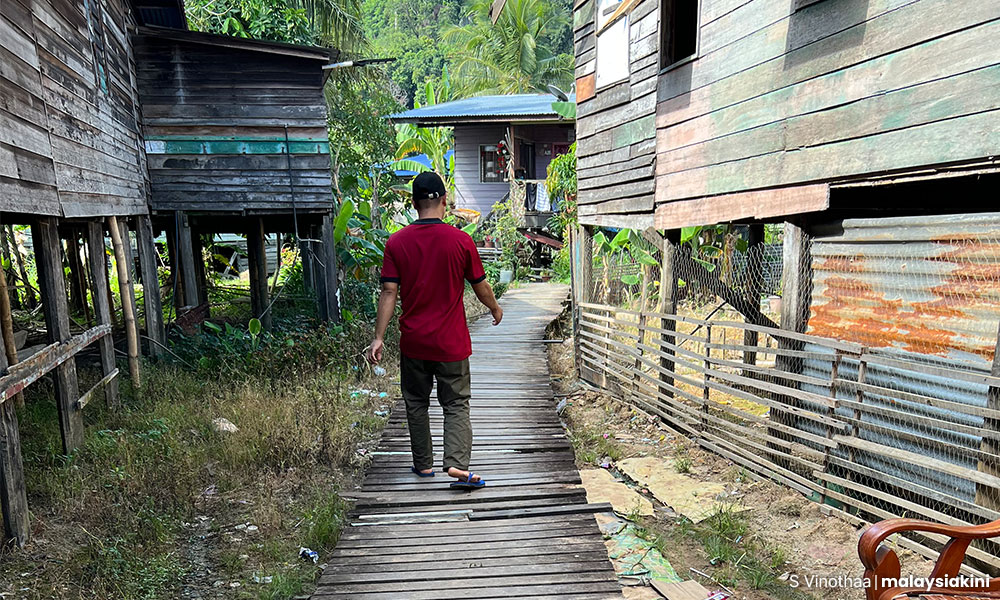
‘Ratify UN Convention against torture’
Criminal lawyer Michelle Rossana Usman from Kota Kinabalu, who was engaged to represent the migrant worker by the Sabah Timber Industry Employees Union of which Sabri is a member, noted Malaysia’s notoriety for its flogging practices.
Quoting a statistic by Amnesty International, Michelle said the international human rights organisation estimates that as many as 10,000 people are subjected to caning in Malaysia every year, most of whom are foreign nationals.
"Sabri was unfortunately whipped for an offence that he could not have been guilty of as he had proper documentation to enter Malaysia as a migrant worker.
"It is high time Malaysia ratifies the UN Convention against Torture and Other Cruel, Inhuman or Degrading Treatment or Punishment.
"The government also needs to ratify the International Covenant on Civil and Political Rights," she stressed.
Michelle, who is a member of the Sabah Human Rights Centre, pointed out that Sabri's case was an example of a workers' union member who was wrongfully charged with crimes he was not guilty of.
"What about the thousand others who are charged in our courts but are not represented at all?" she asked.
Michelle urged the government to amend existing legislation to treat immigration violations as administrative offences, rather than crimes punishable with imprisonment and caning.
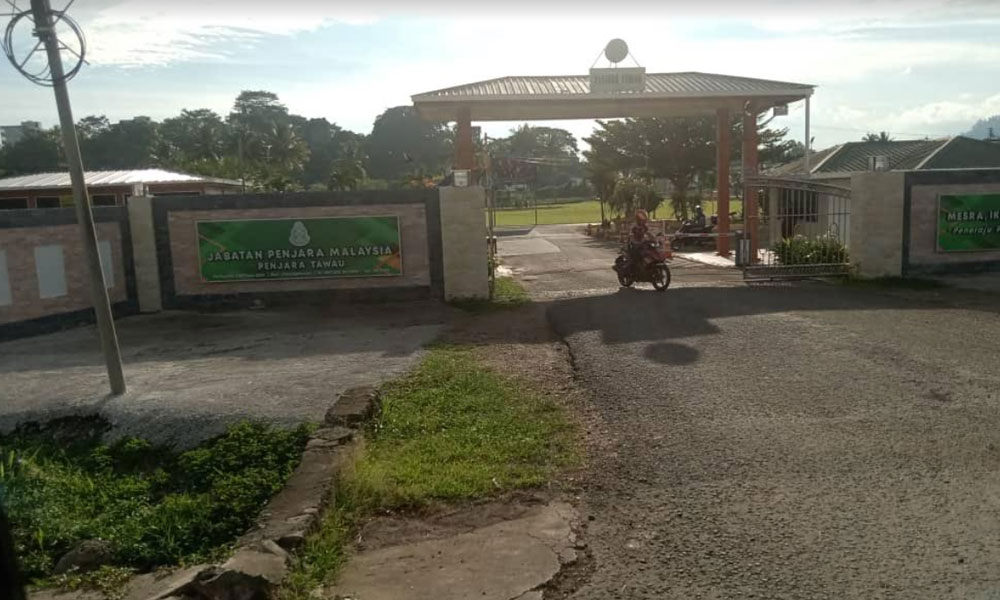
Judicial caning in Malaysia and Saudi Arabia
Judicial caning in Malaysia is meted out for more than 60 criminal offences such as drug trafficking, rape, illegal entry into Malaysia under the Immigration Act 1959/63 and making false passports under the passport Act 1966.
According to the Amnesty International Report 2020/21, the judicial caning sentence was also meted out to Rohingya refugees during the pandemic.
Following protests from local activists, the sentence was set aside for the 27 Rohingya refugees at a hearing in the High Court in Alor Setar in 2020. However, the migrants continued to be caned, in addition to their prison sentences for illegal entry into Malaysia.
The 27 refugees, who were among 40 refugees convicted by a Magistrate’s Court in Langkawi for entering Malaysia without a valid permit, had obtained legal representation to appeal.
The 40 were also sentenced to seven months in jail.
The High Court in Alor Setar decided that caning would be inhumane as the men were refugees with no prior history of criminal activity or violence.
Meanwhile, a country that was known to carry out flogging in public squares, Saudi Arabia, abolished that corporal punishment in April 2020.
Crown Prince Mohammed Salman has spared the rod and offenders will instead be fined or receive jail sentences. - Malaysiakini, 17/8/2022

Survey: In Malaysia, refugees, immigrants, Indians seen as more vulnerable to torture and ill-treatment
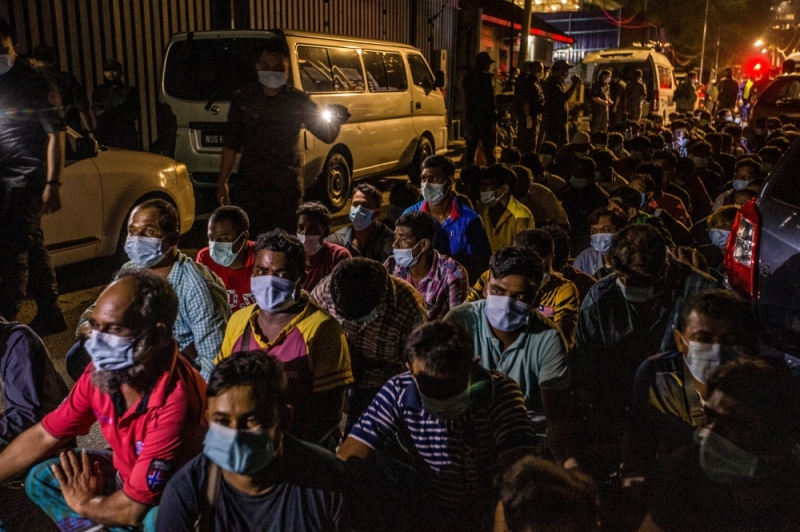
KUALA LUMPUR, June 23 — Refugees, immigrants and those of particular races or ethnicities were identified by local human rights experts to be more at risk of being subject to torture or ill-treatment in Malaysia in 2022, the latest edition of an international human rights tracker released yesterday said.
In the Human Rights Measurement Initiative’s (HRMI) Rights Tracker 2023, it measured the Malaysian government’s respect for five rights under the Safety from the State category, with Malaysia having the lowest score for the right to freedom from torture and ill-treatment, at 4.9 out of 10.
As a whole, Malaysia scored 7.0 out of 10 on its government’s respect for the rights of Safety from the State, better than the two other South-east Asian countries which had an overall score for these rights — Thailand (5.4) and Vietnam (4.9).
But Michaelle Phoenix Yeo, HRMI’s East and South-east Asia Lead, said a significant number of people in Malaysia “are not safe from various violations including torture and ill-treatment, and arbitrary arrest”.
“Malaysia scored particularly low on the right to freedom torture and ill-treatment. It is one of the rare democracies that has not yet ratified the UN Convention against Torture and Other Cruel, Inhuman or Degrading Treatment or Punishment,” Yeo said in a statement.
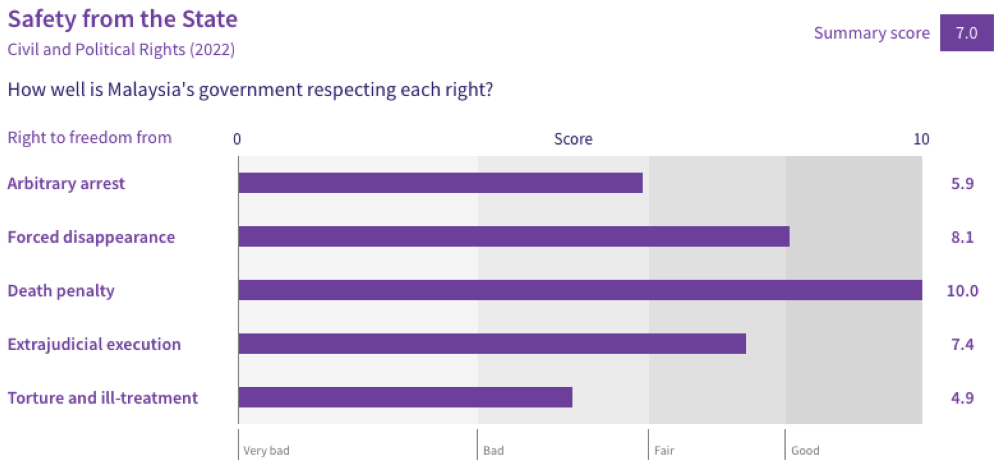
Who are the groups viewed to be more at risk?
In HRMI’s survey of local human rights experts asked on who were especially vulnerable to torture and ill-treatment by government agents in 2022, they mentioned that “torture tends to occur in detention facilities, and there is lack of police accountability when deaths occur in custody”.
“Refugees, mainly those of Indian and Indigenous descent are the biggest demographic affected,” HRMI said of one of the points stated by the respondents.
According to HRMI, the survey respondents also said those who support the Opposition — particularly PKR or DAP — are subject to ill-treatment, and that LGBTQIA+ people are “at risk of torture, such as public caning”. PKR and DAP were formerly the federal Opposition, but are now part of the ruling coalition since the general elections last November.
Based on the survey, 54 per cent of local human rights experts identified migrants/immigrants and refugees/asylum seekers as two groups being at risk of torture and ill-treatment, while others at risk include detainees or those accused of crimes (38 per cent), LGBTQIA+ people (38 per cent), people of particular races (38 per cent), those with particular ethnicities (23 per cent) and those with particular political affiliations or beliefs (23 per cent).
In the same HRMI survey, the experts said those especially vulnerable to arbitrary or political arrest and detention by government agents in 2022 include “anyone who speaks publicly against the government or demands their rights”, and “Rohingya people and indigenous people, mainly Orang Asli”.
The experts also mentioned artists (especially those who produce works that are satirical of the government or related to LGBTQIA+ issues) and those engaged in peaceful protests or demonstrations (especially those related to women’s rights or LGBTQIA+ rights).
Those identified by the local experts as being at risk of arbitrary arrest include people with particular political affiliations or beliefs (identified by 69 per cent of experts), those who protest or engage in non-violent political activity (62 per cent), human rights advocates (46 per cent), migrants/immigrants (38 per cent), those of particular ethnicities (38 per cent), refugees/ asylum seekers (38 per cent), labour union members or workers’ rights advocates (31 per cent), people of particular races (31 per cent), and people without a legal identity (31 per cent).
When asked in the survey to give context on who was especially vulnerable to forced disappearance or disappearance by government agents, the HRMI survey respondents said there was a lack of transparency about the “whereabouts of missing people, particularly Christian people, migrants, refugees, and LGBTQIA+ people”.
The respondents also said “Malaysian Muslim people are reportedly sent away to government-funded religious camps”, and also mentioned “pastors of religions that the government does not agree with, and their families” as vulnerable groups.
The full data from HRMI’s Rights Tracker 2023 can be found at https://rightstracker.org/ - Malay Mail, 23/6/2023.
Suhakam lauds govt for labelling caning as excessive, says time to end corporal punishment
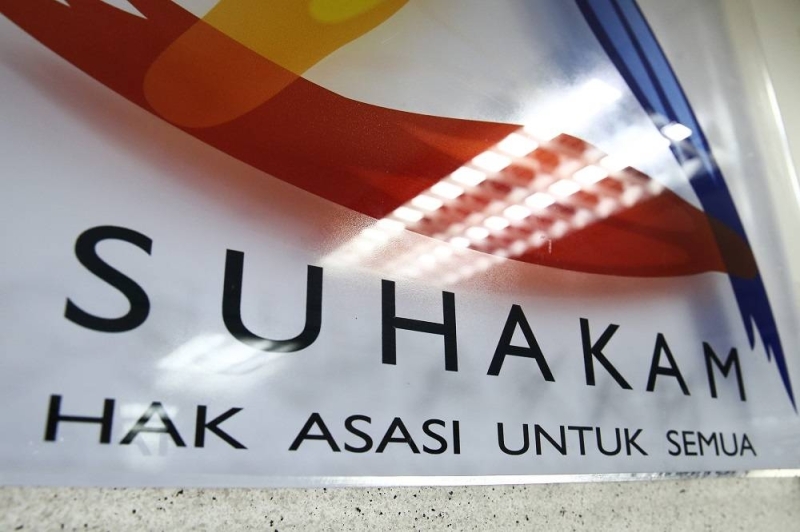
KUALA LUMPUR, Aug 23 — The Human Rights Commission (Suhakam) today expressed support for Minister in the Prime Minister's Department (Parliament and Law) Datuk Seri Wan Junaidi Tuanku Jaafar's stance on considering caning as excessive punishment.
Suhakam urged the government to prohibit corporal punishment by abolishing all domestic laws warranting the imposition of corporal punishment such as whipping and caning, which are all inconsistent with international human rights principles.
"Suhakam calls on the government, as duty bearer to ensure the prohibition of torture and to expeditiously institute measures nationwide, including a comprehensive Plan of Action for Torture Prevention be developed, taking into account three interrelated elements including a legal framework that prohibits torture, effective implementation of the legal framework and mechanisms to monitor the legal framework and its implementation,” it said in a statement today.
The human rights commission also reiterated its strong commitment towards fight against torture and continued advocacy for the accession to the United Nations Convention Against Torture and Other Cruel, Inhuman or Degrading Treatment or Punishment (UNCAT) and its Optional Protocol.
It also mentioned that it will always support the prohibition against torture as is enshrined in both Article 5 of the Federal Constitution and Article 3 of the 1948 Universal Declaration of Human Rights (UDHR).
Yesterday, the government through the Legal Affairs Division and the Attorney General's Chambers (AGC) said that it is studying alternative punishments to replace caning which is seen as cruel and inhumane.
Wan
Junaidi is of the view that lashing up to 15 times is considered
excessive as it takes only three lashes to 'destroy the flesh' of a
person even though many may disagree with that view. - Malay Mail, 23/8/2022
Report: Malaysia to end mandatory death and whipping sentences by 2023, says law minister

Kuala Lumpur, Sept 6 — Minister in the Prime Minister’s Department (Parliament and Law) Datuk Seri Wan Junaidi Tuanku Jaafar said that Malaysia will abolish the mandatory death and whipping sentences by next year, with amendments to the laws to be tabled in Parliament next month.
Wan Junaidi told English daily The Star that judges will be given the discretion to hand down the two sentences instead if the amendments are passed.
“If everything goes well and there are no disruptions to the coming Budget session, we will no longer have the mandatory death sentence in 2023,” said Datuk Seri Wan Junaidi.
“This will also apply to whipping as it will be left to the discretion of the judges,” he added.
Wan Junaidi said he intended to table the proposed amendments during the Parliament meeting that begins on October 3.
“The amendments on the mandatory death sentences will cover amendments to 33 sections under the law and involve mandatory death sentences for 11 offences,” he added.
It is understood that the 11 offences comprise nine under the Penal Code and two under the Firearms (Increased Penalties) Act.
On whipping, Wan Junaidi said the proposed amendments would not do away with the punishment, but again give judges the discretion on whether to impose it.
“Personally, I view whipping as very brutal and violent and simply inhumane.
“This is why I am suggesting that judges have the discretion to impose the punishment,” he said, adding that most offenders suffer open wounds with many fainting after three strokes.
With discretion given, judges can weigh the gravity of the harm committed by offenders on their victims before imposing the punishment, he added.
Wan Junaidi added that he would meet the Attorney General’s Chambers (AGC) soon to discuss the matter before seeking Cabinet approval to table the amendments.
When asked about those who are currently on death row, he said that the government was still mulling its options.
According to The Star, there are still 1,342 convicts facing the gallows as of June 2022.
The
abolition of the mandatory death sentence was first raised by the
Pakatan Harapan administration in 2018 and a moratorium on execution was
then implemented. - Malay Mail, 6/9/2022
Do away with ‘sadistic, inhumane’ caning, PH MP tells govt
Pasir Gudang MP Hassan Karim says convicts would rather spend more time in jail than endure ‘pain and injuries’ they suffer from being caned.
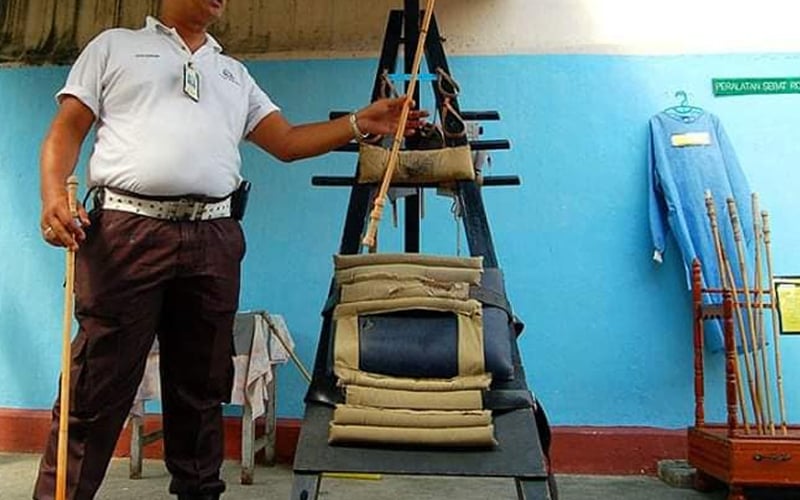
KUALA LUMPUR: Putrajaya must do away with the caning of convicts, a government backbencher told the Dewan Rakyat.
Hassan Karim (PH-Pasir Gudang) said that such a punishment was “sadistic, primitive and inhumane”.
He said that in his experience as a lawyer, he knew of prisoners who would rather spend another year in prison than be caned because of the “excruciating pain and injuries” they will suffer.
“Not only do we need to remove the mandatory death penalty, but we also need to abolish caning as a punishment by civil courts,” he told the Dewan Rakyat when debating the bill to abolish the mandatory death penalty.
In response, deputy law and institutional reform minister Ramkarpal Singh said that the proposal would be taken into consideration.
“We will study this (caning) matter thoroughly in the near future,” he said when winding up the debate.
The Dewan Rakyat then passed the bill through a voice vote.
Caning is meted out on offenders convicted of rape, sexual harassment, robbery and kidnapping.
In the past Amnesty International Malaysia described caning as a form
of torture, saying such punishments went against the UN Convention
against Torture and Other Cruel, Inhuman or Degrading Treatment or
Punishment (UNCAT) which Malaysia had yet to ratify.- FMT, 3/4/2023
Press Release: Abolish whipping for any offence
24 Aug 2009 4:16 pm
As recently as at its 61st Annual General Meeting held on 17 March 2007, the Malaysian Bar resolved to denounce and reject whipping as a punishment for any offence as it is anachronistic and inconsistent with a compassionate society. Our position echoes international human rights norms that condemn whipping and other forms of corporal punishment as cruel, inhuman or degrading and call for its abolition. Moreover, there is empirical evidence to support the fact that whipping has failed as a retributory and deterrent sentence.
Under Malaysian civil law, the whipping of women is prohibited. The whipping of men in certain categories of age and health is also prohibited. The Government has committed itself to prevent the whipping of children under the Convention on the Rights of the Child. These are positive first steps in the journey towards a total prohibition against whipping as a form of punishment for all persons, regardless of age or gender, and whether under civil or Syariah law.
We call on the authorities to overturn the sentence of whipping handed down in Kartika’s case and the cases of those who were arrested with her. We strongly urge the Government to reject whipping as a form of sentencing for any offence, and to abolish it altogether.
Ragunath Kesavan
President
Malaysian Bar
24 August 2009 - Malaysian Bar Website
No comments:
Post a Comment